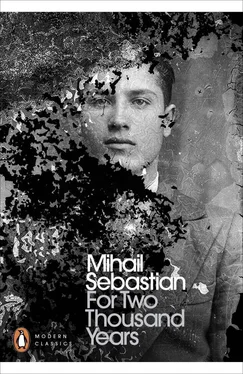I’ve never had a conversation with someone without wondering apprehensively whether they know I’m a Jew and, if so, whether they’ll forgive me or not. This was a real problem to me, and caused me an absurd degree of suffering and awkwardness. So, I had resolved long ago to renounce all equivocation and to clarify the matter from the outset, confessing everything brusquely and readily, which must often have seemed the mark of aggressive pride, when in fact it was only wounded pride.
I tried behaving this way with Vieru, right from the first day, to explain myself concerning this issue, but he quickly cut me short.
‘My dear fellow, it doesn’t concern me. It’s a personal matter and I beg you to keep it to yourself. Do you want me to tell you if I’m an anti-Semite? I don’t know. I’m not familiar with the matter, it doesn’t interest me, never could. But I’ll say one thing: any general judgement about a category of people gives me the shudders. I’m not a mystic. I have a horror of generalizations. I can only judge specific cases, individual people, detail by detail.’
I thought he was trying to be nice. Later though, getting to know him, I realized how sincere his opening declaration was. It wasn’t directed at me personally, but reflected his convictions. I subsequently found this to be true not only in Vieru’s attitude to anti-Semitism — in the end a minor matter for him — but in his attitude as an artist, a critic and an architect.
I think it was in the first year of the Uioara project that someone turned up one fine day to ask his opinion for a feature in The Universe about ‘the national character’. I cut out his reply and still have it today.
There is doubtless such a thing as a ‘national character’. In art, it is the lowest common denominator. The more specific the character, the more commonplace it is. That is why creation always requires overcoming such a character.
An artist, if he is anything, is an individual. But to be an individual means embodying your own truths, suffering your own experiences, and inventing your own style. But these things can only occur by renouncing facility, and the most unfortunate facility comes from these so-called national characters, formed by the sedimentation of collective mediocrity, which lies there ready-made. National character is by definition that which remains in a culture after you have removed the personal effort involved in thinking, the personal experience of life and the triumph of individual creation. That’s all.
Two weeks of abuse, polemics and revulsion ensued, to which Vieru did not respond. But from Berlin, where he was delivering a paper at the Institute of Current Affairs, Professor Ghiţă sent him a blunt telegram:
Read your views in The Universe . You’re a wretched fool.
To which he replied:
Wretched fool, perhaps. But not of the common kind. My style’s my own.
Yesterday, the professor’s opening lecture. The atmosphere of an important happening, with a note of festivity and tension in the air, as in an arena where, from one moment to the next, something decisive will be thrashed out. The banging of the desktops, voices calling out from one end of the hall to the other, people noisily taking leave of one another, familiar faces, unfamiliar faces — all mixed together confusedly, humming with curiosity and impatience.
Vieru, on his own in the back row, irritated, was drumming his fingers on the bench. I was afraid he’d be recognized, which would have caused a rather tiresome commotion during a lecture that would discuss him enough as it was.
Marin Dronţu was absent. ‘I’m not coming. It makes me sick. Look, I admit I can’t be objective when it comes to the master. I’m not a critic and I don’t know about that sort of thing. I love the master and believe in his destiny. So what do you expect me to gain from Ghiţă Blidaru’s lecture? Whatever he says, whether he’s right or not, it’ll just make me bitter. And I don’t want to be bitter.’
Basically the professor’s lecture — though he advertised it as vehement — was not vehement. It was clear that it was merely the threshold of an entire system of explanations and categorization going well beyond the particular case of Uioara.
I transcribe here from the notes I managed to jot in haste.
Let’s be clear: the issue here is not the value of the architect Vieru’s project in Uioara. Perhaps it shows the mark of genius. What is questionable, however, is its significance in relation to the Romanian spirit and, for this lecture, to the Romanian economy. My question is whether a person has the right to exercise genius when this goes against the needs of the land on which he lives. Further: if someone, as an individual, may interfere in the latent process of the collective life-force, modifying it, imposing upon it an alien, though perhaps superior, project. In fact, the claim to superiority becomes entirely spurious when two differing structures are involved. A shower of rain isn’t superior to a drainpipe, nor a drainpipe superior to a fork. You cannot establish a scale of values between differing phenomena. The crime of an idiot tiger aspiring to be a paramecium would not be less than the crime of a genius paramecium dreaming of being a tiger. A betrayal, a degradation, is involved in both cases, and you won’t find it written anywhere that, from the point of view of life, the degradation of a paramecium is less tragic than that of a tiger.
At Uioara, in five years, a daring man has replaced a settlement of viticulturists with an industrial complex. Based on what calculation? For the sake of the prejudice that values a smokestack above a grapevine. Well, this is a monstrous judgement. Neither a smokestack nor a grapevine, taken alone, mean anything. They only become meaningful when brought into a family, a structure. Outside of this structure, they remain discrete, dead abstractions. The abstraction of a smokestack in Uioara and the no less abstract grapevine in Manchester.
This blindness to the laws specific to life, this blindness to the ways specific to living, is a perversion of those historical roots which must be traced all the way back through the nineteenth century, to the roots of the French revolution and, further, to the roots of reform. Our lectures over the past years have sketched the general framework of the problem. I propose this year that we study several particular aspects of the Romanian economy, deformed by the revolutionaries of 1848 and liberalism to the point of smothering the most elementary local features.
It was a beautiful lecture, and Vieru had to admit it. We took a walk together afterwards.
‘Decidedly, I’m never going to see eye to eye with Professor Ghiţă. He’s a seminarian, a theologian. A man who’s happy when he can be subject to something, whatever it may be. With a thousand Moldovans and a thousand Muntenians like him, I’m not surprised that for centuries this place has been dominated by whoever imposed their will: Turks, Russians, Phanariote Greeks. His whole life consists of subjugations. “Subject to the demands of life,”’ as he’d say. Subjugation to everything above and beyond you. For my part, the day I start to believe that by the very fact of being a man I’m condemned to be circumscribed in this way, I’ll shoot myself. If I’m not free, then I’m nothing. Free to think, free to ascribe values or fix hierarchies. The world can be understood through critical discrimination or through rigorous examination. And, conversely, it can go permanently dark if we give up on thinking and take refuge in mystical intuitions.’
Ghiţă Blidaru and Mircea Vieru are divided by a whole history, an entire worldview. Were it not for the picturesque aspect of each, Vieru with his blond faun-like head, Ghiţă Blidaru like a wintry wolf, were it not for their colourful and contrasting lives, with their passions, struggles and loves, what fine characters in a Platonic dialogue those two would make, these two ideological poles! ‘The drama of modern Romanian history’, as portrayed by two heroes. Utterly schematic, but representative nonetheless.
Читать дальше












